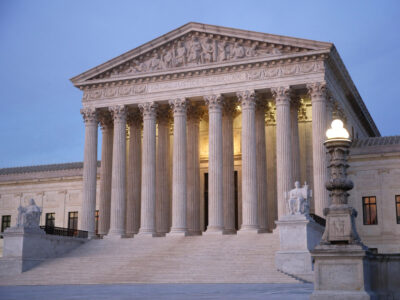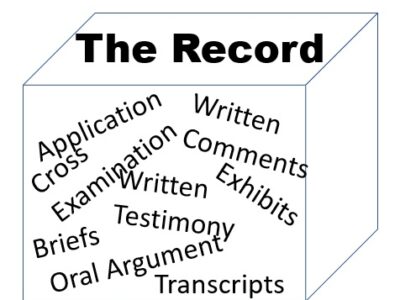Month: July 2024
Understanding Loper: The Grandfather Clause
Hundreds of past federal cases relied on Chevron. They remain good law.
To cushion the shock of abandoning Chevron, the Supreme Court created a safe harbor for past judicial decisions. This was well-advised. The Court itself applied Chevron at least seventy times, as did thousands of lower court decisions. The key question will be the scope of the grandfather clause. The Court’s discussion began by saying that …
Continue reading “Understanding Loper: The Grandfather Clause”
CONTINUE READINGUnderstanding Loper: The Primacy of Skidmore
A previously obscure 1944 case will now be central to judicial review.
Some commentators have tended to write off Skidmore and assume that judges will ignore agency views after Loper Bright. That is a misreading of the Court’s opinions in Loper and in Skidmore itself.
CONTINUE READING$10 Billion Climate Bond Heads to the California Ballot
Prop 4 would authorize the issuance of bonds in the amount of $10 billion toward safe drinking water and groundwater, wildfire and forest programs, and to combat sea level rise.
After much anticipation and deliberation, the California legislature approved a $10 billion climate bond measure just before the summer recess began on July 3, 2024. California voters will now have the opportunity to approve or reject the bond measure on the November ballot. The bond measure will now be referred to as Proposition 4 on …
Continue reading “$10 Billion Climate Bond Heads to the California Ballot”
CONTINUE READINGUnderstanding Loper: Delegation & Discretion
Something similar to Chevron deference may still apply to many (most?) regulations.
The Supreme Court took away Chevron deference, but it also recognized that Congress can give agencies the power to clarify statutes and fill in gaps.
CONTINUE READINGPlaying fast and loose with reality
How the US Supreme Court’s recent decisions enable greater reliance on “alternative” facts
As the U.S. Supreme Court has moved into an era of second-guessing federal administrative agencies to an extent that we have not seen in 80 years, it has delivered yet another blow to reliance on accurate facts. When I served as an administrative law judge for California’s state utility regulators, my job in each proceeding …
Continue reading “Playing fast and loose with reality”
CONTINUE READING(Energy) Independence Day
A post in which I surprise readers — and myself — with strong praise for George W. Bush.
The only way to achieve energy independence is to achieve independence from fossil fuels. That’s not something we can achieve overnight, but the closer we come, the better — for our health, our national security, and the world.
CONTINUE READINGCalifornia can help meet its climate goals by removing SERP’s sunset date
By Molly Bruce, Dave Smith, Michael Kiparsky, Derek Hitchcock, Peter Van De Burgt, Sydney Chamberlin, Megan Cleveland
Many regulatory clearances like permits aim to guard against projects that pose harm to the environment. However, permitting can also undercut environmental restoration efforts. While restoration is designed to remedy environmental harms and improve resilience to climate change, permitting can substantially increase project costs and slow or altogether impede environmentally beneficial projects. Striking an effective …
Continue reading “California can help meet its climate goals by removing SERP’s sunset date”
CONTINUE READINGA New Era of Conservation on the Horizon
Lessons from philanthropist and conservationist Kris Tompkins after a visit to the UCLA Emmett Institute.
“Sentiment without action is the ruin of the soul.” That line by writer Edward Abbey is a favorite quote of Kris Tompkins. She’s the legendary conservationist and philanthropist who recently visited UCLA Law at the invitation of the Emmett Institute and the Lowell Milken Center for Philanthropy and Nonprofits. Ever since Thompkins’s visit with …
Continue reading “A New Era of Conservation on the Horizon”
CONTINUE READINGJudicial Review After Loper Bright
We used to have the Chevron test? What test do we have now?
Loper Bright has created a new two-part test for courts to apply when an agency has interpreted a statute. It’s not the same as Chevron, but it does have some family resemblance.
CONTINUE READINGIs the Sky Falling? Chevron, Loper Bright, and Judicial Deference
Perplexed? Worried? Here’s a guide to a fraught area of law.
If you’re confused about the Supreme Court’s ruling, you’re not alone. Scholars will be discussing the recent ruling for years. It clearly will limit the leeway that agencies have to interpret statutes, meaning less flexibility to deal with new problems. But unlike many commentators, I don’t think the sky is falling. I was teaching environmental …
Continue reading “Is the Sky Falling? Chevron, Loper Bright, and Judicial Deference”
CONTINUE READING









